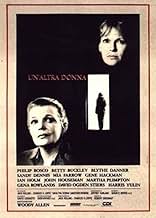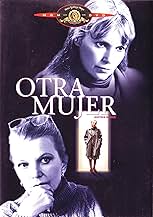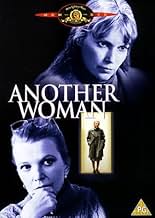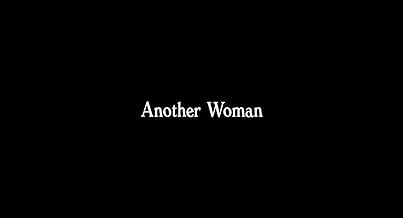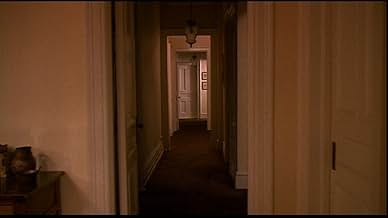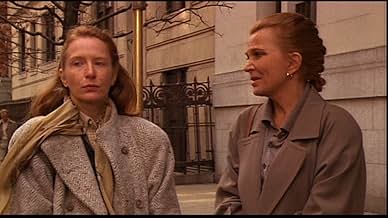IMDb रेटिंग
7.2/10
16 हज़ार
आपकी रेटिंग
मध्य-जीवन के संकट का सामना करती हुई एक महिला, एक नई किताब लिखने के लिए एक मनोचिकित्सक कार्यालय के बगल में एक अपार्टमेंट किराए पर लेती है, लेकिन उस डॉक्टर से मदद मांगने वाली एक गर्भवती महिला ... सभी पढ़ेंमध्य-जीवन के संकट का सामना करती हुई एक महिला, एक नई किताब लिखने के लिए एक मनोचिकित्सक कार्यालय के बगल में एक अपार्टमेंट किराए पर लेती है, लेकिन उस डॉक्टर से मदद मांगने वाली एक गर्भवती महिला के कष्ट की तरफ आकर्षित हो जाती है.मध्य-जीवन के संकट का सामना करती हुई एक महिला, एक नई किताब लिखने के लिए एक मनोचिकित्सक कार्यालय के बगल में एक अपार्टमेंट किराए पर लेती है, लेकिन उस डॉक्टर से मदद मांगने वाली एक गर्भवती महिला के कष्ट की तरफ आकर्षित हो जाती है.
- पुरस्कार
- 1 जीत और कुल 3 नामांकन
फ़ीचर्ड समीक्षाएं
10canadude
It's worth noting that in 1978, ten years before he made "Another Woman," Woody Allen created another quiet film, a drama with prominent Bergmanesque influences. The film was called "Interiors," and it was a tribute, or an American take on Bergman's "Cries and Whispers." "Interiors" examined the relationships of three sisters and their husbands in the face of the divorce of their dominant mother and detached father. The film essentially detailed the fall of "interiors," or illusory worlds created by the dominant mother in the face of tragedy and loneliness.
"Another Woman," made ten years later, shares similar themes with "Interiors," but it is more akin to Bergman's "Wild Strawberries" than to "Cries and Whispers." It is a story of a university professor, played spectacularly by Gena Rowlands, in whom something stirs when she overhears a therapy session with a young 30-something woman who is discontent with her life. The professor, Marion, feels an emptiness rise inside her - an emptiness that had settled there years before, that she can consciously feel now. Little by little, like in "Interiors," the world she has constructed for herself, a cold, cerebral world, deconstructs.
Marion despairs, enters into conflicts with herself, and questions endlessly trying to reason her way out of her malaise. But the cure for her malaise is not rational resolution and she, realizing that her strongest characteristic (namely her rational intelligence) is not enough to untangle what worries her, finds herself entirely helpless in the face of an unraveling existence.
Her drama is very much like the drama of Professor Isak Borg from Bergman's film, a man on his way to receive a medal for his lifetime achievements. And, on the road, he also succumbs to the same malaise as Marion, the same questioning and the same painful re-evaluation. The horror shared by both Marion and Professor Borg, of course, is that despite their highly lauded accomplishments and their intellectual self-satisfaction, they feel void. There must, in other words, be something else to life than strictly intellectual work, however satisfying it may be.
In Bergman (both "Cries and Whispers" and "Wild Strawberries") and in Allen (both "Interiors" and "Another Woman") life falls under question. The entire existence is evaluated, its worth and meaning doubted. In "Interiors" and "Cries and Whispers," however, the meaninglessness pervades everything in the films - the dialogues, behaviors and even visuals. The sisters in "Interiors" shatter the mother's reality and find nothingness - they continue as they were, much like the two sisters in "Cries and Whispers" for whom the death of their young sister changed absolutely nothing, and only confirmed their beliefs about the world.
However, "Another Woman" is not as stark (though it is stark indeed at times). Marion grabs at the chance to re-evaluate the life she feels she painfully wasted and tries to start again. It's not a false choice, or a gimmick on Allen's part, but it's a true depiction of Marion's sincere desire to continue to struggle because her life does have value for her. She rediscovers a passion for the struggle and her motivation is the same curiosity that made her go through the questioning process in the first place.
"Another Woman" is a testament to the fact that Woody Allen was still at the top of his game in the late 1980s. It is a brilliant, honest and (surprisingly) warm film. It is not a remake or rip-off of Bergman's work, though it is highly influenced by him (which shouldn't seem so surprising to anyone, because Bergman himself was influenced by the most basic questions of existence). "Another Woman" is an existential film that is both uncompromising and not hopeless. It's one of my favorite Woody Allen films and it reveals to us not only a great American director, but one whose films are of worldly greatness.
"Another Woman," made ten years later, shares similar themes with "Interiors," but it is more akin to Bergman's "Wild Strawberries" than to "Cries and Whispers." It is a story of a university professor, played spectacularly by Gena Rowlands, in whom something stirs when she overhears a therapy session with a young 30-something woman who is discontent with her life. The professor, Marion, feels an emptiness rise inside her - an emptiness that had settled there years before, that she can consciously feel now. Little by little, like in "Interiors," the world she has constructed for herself, a cold, cerebral world, deconstructs.
Marion despairs, enters into conflicts with herself, and questions endlessly trying to reason her way out of her malaise. But the cure for her malaise is not rational resolution and she, realizing that her strongest characteristic (namely her rational intelligence) is not enough to untangle what worries her, finds herself entirely helpless in the face of an unraveling existence.
Her drama is very much like the drama of Professor Isak Borg from Bergman's film, a man on his way to receive a medal for his lifetime achievements. And, on the road, he also succumbs to the same malaise as Marion, the same questioning and the same painful re-evaluation. The horror shared by both Marion and Professor Borg, of course, is that despite their highly lauded accomplishments and their intellectual self-satisfaction, they feel void. There must, in other words, be something else to life than strictly intellectual work, however satisfying it may be.
In Bergman (both "Cries and Whispers" and "Wild Strawberries") and in Allen (both "Interiors" and "Another Woman") life falls under question. The entire existence is evaluated, its worth and meaning doubted. In "Interiors" and "Cries and Whispers," however, the meaninglessness pervades everything in the films - the dialogues, behaviors and even visuals. The sisters in "Interiors" shatter the mother's reality and find nothingness - they continue as they were, much like the two sisters in "Cries and Whispers" for whom the death of their young sister changed absolutely nothing, and only confirmed their beliefs about the world.
However, "Another Woman" is not as stark (though it is stark indeed at times). Marion grabs at the chance to re-evaluate the life she feels she painfully wasted and tries to start again. It's not a false choice, or a gimmick on Allen's part, but it's a true depiction of Marion's sincere desire to continue to struggle because her life does have value for her. She rediscovers a passion for the struggle and her motivation is the same curiosity that made her go through the questioning process in the first place.
"Another Woman" is a testament to the fact that Woody Allen was still at the top of his game in the late 1980s. It is a brilliant, honest and (surprisingly) warm film. It is not a remake or rip-off of Bergman's work, though it is highly influenced by him (which shouldn't seem so surprising to anyone, because Bergman himself was influenced by the most basic questions of existence). "Another Woman" is an existential film that is both uncompromising and not hopeless. It's one of my favorite Woody Allen films and it reveals to us not only a great American director, but one whose films are of worldly greatness.
Woody Allen's "Another Woman" is, upon rediscovery, a film of great power and feeling. Sadly, not many people will be open to rediscovery after the initial viewing.
Gena Rowlands stars as Marion Post, a 50ish philosophy professor whose life is in order. She rents an apartment to work on her latest book. By accident, she discovers that through the heating duct, she can hear all conversations from the psychiatrist located in said building. At first, she covers the duct with cushions to block the sound, but she decides to listen in after hearing, by accident, the testimony of a young pregnant woman. This sets in motion a chain of events that changes Marion forever.
Woody has said that he originally conceived the idea as a comedy and indeed, it could be played that way (on a smaller scale in "Everyone Says I Love You"). But here, Allen resists the temptation to play it for laughs. In fact, there is not one single moment of comedy relief in his film. I think that is a wise decision. I was so absorbed by Marion's journey that comedy would have broken the mood of the film. This film is another venture into Bergmanesque cinema and "Another Woman" can compare with the very best Bergman.
Gena Rowlands hasn't had a role this good since the films of her late husband John Cassavetes. This in fact, shows another side of Rowlands; a more restrained, mannered character than the fiery, passionate characters in the Cassavetes films. It just shows the different types of roles Rowlands can play so well. She deserved an Oscar nomination for this.
In fact, the whole film is well cast by Allen. Gene Hackman is great in a mellow part as Marion's ex-lover. Blythe Danner makes a return to form as Marion's best friend. It is great to see Danner do what she does best, especially following the horrible "Brighton Beach Memoirs" in which she was underused. Ian Holm is superb as Marion's husband, who as Roger Ebert puts it "must have a wife so he can cheat on her". In his final film, John Houseman allows himself to appear weak and frail; quite a change from the pillar of strength in "The Paper Chase" and a good cap to a great career.
I mentioned at the beginning that not many people will be open to rediscovering "Another Woman". I think that is correct. Here are my reasons why. First, the film is deliberately paced, even with a short running time of 81 minutes. Most viewers' attention spans won't be able to tolerate the long takes Allen is famous for. Second, the film doesn't offer any instant gratification or closure. Allen's story is one of those stories that just can't have a typical happy Hollywood ending. Third, there is T&A, even though adultery plays a large part in the story. So if you're looking for a fast paced film with T$A and guns and action and a happy ending, you might as well move on.
"Another Woman" is one of those films in which rediscovery is necessary. Allen packs so much into 81 minutes that multiple viewings are necessary to absorb it all. If you make the effort to see it again, you might find that "Another Woman" is a film of great power and feeling that works better every time you see it.
**** out of 4 stars
Gena Rowlands stars as Marion Post, a 50ish philosophy professor whose life is in order. She rents an apartment to work on her latest book. By accident, she discovers that through the heating duct, she can hear all conversations from the psychiatrist located in said building. At first, she covers the duct with cushions to block the sound, but she decides to listen in after hearing, by accident, the testimony of a young pregnant woman. This sets in motion a chain of events that changes Marion forever.
Woody has said that he originally conceived the idea as a comedy and indeed, it could be played that way (on a smaller scale in "Everyone Says I Love You"). But here, Allen resists the temptation to play it for laughs. In fact, there is not one single moment of comedy relief in his film. I think that is a wise decision. I was so absorbed by Marion's journey that comedy would have broken the mood of the film. This film is another venture into Bergmanesque cinema and "Another Woman" can compare with the very best Bergman.
Gena Rowlands hasn't had a role this good since the films of her late husband John Cassavetes. This in fact, shows another side of Rowlands; a more restrained, mannered character than the fiery, passionate characters in the Cassavetes films. It just shows the different types of roles Rowlands can play so well. She deserved an Oscar nomination for this.
In fact, the whole film is well cast by Allen. Gene Hackman is great in a mellow part as Marion's ex-lover. Blythe Danner makes a return to form as Marion's best friend. It is great to see Danner do what she does best, especially following the horrible "Brighton Beach Memoirs" in which she was underused. Ian Holm is superb as Marion's husband, who as Roger Ebert puts it "must have a wife so he can cheat on her". In his final film, John Houseman allows himself to appear weak and frail; quite a change from the pillar of strength in "The Paper Chase" and a good cap to a great career.
I mentioned at the beginning that not many people will be open to rediscovering "Another Woman". I think that is correct. Here are my reasons why. First, the film is deliberately paced, even with a short running time of 81 minutes. Most viewers' attention spans won't be able to tolerate the long takes Allen is famous for. Second, the film doesn't offer any instant gratification or closure. Allen's story is one of those stories that just can't have a typical happy Hollywood ending. Third, there is T&A, even though adultery plays a large part in the story. So if you're looking for a fast paced film with T$A and guns and action and a happy ending, you might as well move on.
"Another Woman" is one of those films in which rediscovery is necessary. Allen packs so much into 81 minutes that multiple viewings are necessary to absorb it all. If you make the effort to see it again, you might find that "Another Woman" is a film of great power and feeling that works better every time you see it.
**** out of 4 stars
There was a certain period in Woody Allen's career when he was trying desperately to imitate Ingmar Bergman's work. It rarely worked, and often turned out disasters like the execrable September. Another Woman is a riff on Bergman's Wild Strawberries: a college professor, played by Gena Rowlands, is past fifty and looking back on and reliving key events in her life as her present life is falling apart. The film is quite stagy at times, just as it was in September, Allen's previous film. He seems to think that adds something, but it really doesn't. One other problem Another Woman has is a couple of very clunky scenes, and a few poor bit performers, which were much bigger problems in September, which was actually the last Allen film that I saw and the one that made me subconsciously avoid him for the past several months. Allen's script here is excellent. He has produced an excellent character study which is probably unsurpassed in all of his other films that I've seen. The lead actors are wonderful here, Rowlands, Ian Holms, Blythe Danner, Sandy Dennis, and Gene Hackman. Allen's use of piano music is beautifully touching. It all adds up to a very touching and sad little film. It might not be Woody's best film, but it ought to be better respected and known. 8/10.
Devastating, unlike anything I've seen from Woody Allen so far. This was a very quiet, deliberately paced exploration into a woman facing a mid-life crisis, played with extraordinary skill by Gena Rowlands. It leaned maybe a little too much on narration when it could have utilized her talent as an actress instead, but that's a small complaint when the final result is so powerful.
Rowlands' Marion Post rents an apartment in order to work on her novel and, through hearing the patients of the psychiatrist's office next door, slowly begins to examine her life and the choices that she has made. We see her interact with those surrounding her, be it her husband, her daughter, her brother, but she always feels a level removed from all of them. Over the years she has isolated herself from everyone around her and examines them rather than interacts, and Rowlands plays this with a knowledge so fitting and serene.
There's an extended dream sequence a little over halfway through the picture that is one of the most surreal, emotional and illuminating experiences I've had in a Woody Allen picture and one of my favorite moments in the twenty or so films of his I've seen. It imagines her life as a stage play that she watches take place, and it opens the world back up to Marion, which is displayed in master strokes on the all-telling face of Rowlands. She gives a performance for the ages here, working mostly from the inside out, although there are a few devastating scenes of her letting herself fall apart.
I was surprised at how little Mia Farrow was in it, given that she's on the cover for it and the plot synopsis makes her part seem a lot more major, but she manages to leave an impression, although the most surprising of the supporting cast was Gene Hackman. I'm used to seeing him (and loving him) in varying crime pictures, so it was nice to see him take on a more grounded and every day character, which despite only appearing for a brief time he manages to leave a lasting impression with his emotionally conflicted portrayal. You can really feel this character that he displays, feel his love and heartache in every breath.
Still, the film absolutely belongs to Rowlands, who resonated so deeply inside of me and will surely stick there for a while. She knocks it out of the park in a film that is so unique, cerebral and magnificent from Woody Allen.
Rowlands' Marion Post rents an apartment in order to work on her novel and, through hearing the patients of the psychiatrist's office next door, slowly begins to examine her life and the choices that she has made. We see her interact with those surrounding her, be it her husband, her daughter, her brother, but she always feels a level removed from all of them. Over the years she has isolated herself from everyone around her and examines them rather than interacts, and Rowlands plays this with a knowledge so fitting and serene.
There's an extended dream sequence a little over halfway through the picture that is one of the most surreal, emotional and illuminating experiences I've had in a Woody Allen picture and one of my favorite moments in the twenty or so films of his I've seen. It imagines her life as a stage play that she watches take place, and it opens the world back up to Marion, which is displayed in master strokes on the all-telling face of Rowlands. She gives a performance for the ages here, working mostly from the inside out, although there are a few devastating scenes of her letting herself fall apart.
I was surprised at how little Mia Farrow was in it, given that she's on the cover for it and the plot synopsis makes her part seem a lot more major, but she manages to leave an impression, although the most surprising of the supporting cast was Gene Hackman. I'm used to seeing him (and loving him) in varying crime pictures, so it was nice to see him take on a more grounded and every day character, which despite only appearing for a brief time he manages to leave a lasting impression with his emotionally conflicted portrayal. You can really feel this character that he displays, feel his love and heartache in every breath.
Still, the film absolutely belongs to Rowlands, who resonated so deeply inside of me and will surely stick there for a while. She knocks it out of the park in a film that is so unique, cerebral and magnificent from Woody Allen.
8sol-
Bergmanesque territory for Allen again, this is an intriguing and well directed film in Bergman's style, however unlike in some of Allen's earlier Bergman ventures this one feels like less of a copy and more so just a unique drama. The film is philosophical without the ideas seeming intangible, and some of the points are very interesting, like how the pain of others can cause one to realise one's own, and how fascinating it is to hear someone else's revelations. It is not a minute too long, and the dialogue is great, but if one was to flaw it, Allen's choice of music seems a little off-balance, the narration is a touch cold, and whilst not bad, the performances are generally rather ordinary. But all these problems are very slight, as the overall production is fascinating and thought-provoking stuff about how one reflects on oneself.
क्या आपको पता है
- ट्रिवियाWoody Allen is not known for complimenting his actors, saying that the fact that he casts them is proof that he considers them great. However, he has said that the scenes between Gena Rowlands and Gene Hackman, particularly in the flashback of the party, were "electrifying."
- गूफ़Whilst it is true that the tune of Gymnopédie No. 1 is played at the beginning of the film, it is not the piano version but rather the orchestral version orchestrated by Debussy. For some unknown reason, Debussy changed the numbers of the Gymnopédies: thus the orchestral version of Gymnopédie No. 3 bears the tune of Gymnopédie No. 1!
- साउंडट्रैकGymnopédie No 1
Music by Erik Satie
Performed by Orchestre de la Société des Concerts du Conservatoire
Conducted by Louis Auriacombe
Courtesy of EMI Pathé-Marconi/Capitol Records Special Markets
टॉप पसंद
रेटिंग देने के लिए साइन-इन करें और वैयक्तिकृत सुझावों के लिए वॉचलिस्ट करें
- How long is Another Woman?Alexa द्वारा संचालित
विवरण
बॉक्स ऑफ़िस
- बजट
- $1,00,00,000(अनुमानित)
- US और कनाडा में सकल
- $15,62,749
- US और कनाडा में पहले सप्ताह में कुल कमाई
- $75,196
- 16 अक्टू॰ 1988
- दुनिया भर में सकल
- $15,62,749
इस पेज में योगदान दें
किसी बदलाव का सुझाव दें या अनुपलब्ध कॉन्टेंट जोड़ें



